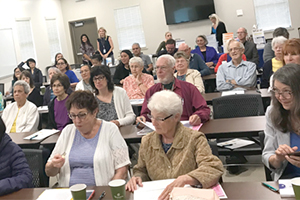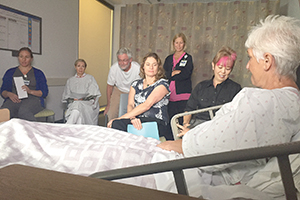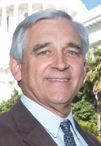CHA will help scale the initiative being developed in California to spread best practices in pastoral and clinical care
By JULIE MINDA
Bishops in California, churches throughout the state and the state's two largest Catholic health systems are partnering to help ensure that people who are chronically and terminally ill get compassionate support from health providers and their church community.

As part of an event connected with the Whole Person Care Initiative, an audience at Blessed Sacrament Church in Westminster, Calif., listens to a panel discussion June 20 on palliative care and spiritual care for people with advanced illness.
California's Catholic bishops, along with Providence St. Joseph Health and Dignity Health created and are leading the Whole Person Care Initiative with the overarching goal of helping transform the way society cares for chronically and terminally ill people.
CHA is supporting the work and will help spread best practices developed in California into clinical and pastoral settings throughout the U.S.
The initiative is intended to promote a deeper understanding of Catholic teaching on end-of-life care among health care providers and parishioners and increase the level of spiritual and practical support parishioners and their loved ones receive in the course of chronic or terminal illness. It includes training for parish leaders and volunteers who minister to the sick on how to encourage and aid people in advance care planning and accessing support services in clinical and community settings.
Another goal is to prioritize and enhance palliative care in the treatment of people with late-stage disease and expand bereavement supports for people whose loved ones have died.
CHA, Dignity Health and Providence St. Joseph Health are providing funding to develop training programs, resource materials and a best-practices repository that will help spread the approach to other states. This repository could include prayers, books and other reading materials, and information about connecting people to community resources.
"We really believe we need to transform how society cares for seriously ill and chronically ill people," says Lori Dangberg, vice president for the Alliance of Catholic Health Care, which represents 51 hospitals that are Catholic or are affiliated with Catholic systems. "We want to make sure parishioners feel loved and supported and can talk openly about their wishes" when they are seriously ill or at the end of life.
Sr. Carol Keehan, DC, CHA's president and chief executive officer, says, "Catholic health care's approach to end of earthly life care is based on the good news that 'life is changed, not ended,'" she says. "That gives a much more hope-filled message to patients and their families facing this critical time."

In a simulation activity at Providence St. Joseph Health's Institute for Human Caring, nurses gather at the hospital bedside of volunteer actor Lynn Taylor to learn how to engage in conversations about serious illness with patients and families. Such trainings are part of the work underway to improve how health care providers deliver whole person care.
Ned Dolejsi is the retiring executive director of the California Catholic Conference, an organization representing the state's bishops and their archdioceses and dioceses. Dolejsi says bishops and leaders of Catholic health systems are "all-in" on the Whole Person Care Initiative.
An affirmative approach
The idea for the initiative began to crystalize at a 2015 gathering of leaders of the Catholic Church and Catholic health care executives and sponsors in California. The meetings are held every few years. By happenstance, the 2015 meeting was to be held just after Gov. Jerry Brown signed the End of Life Option Act, which legalized physician-assisted suicide in California.
"There was a strong feeling that not much would be accomplished by fighting (the new law) from a negative point of view," recalls Bishop Stephen E. Blaire, the now-retired head of the Stockton diocese.
So, says Dangberg, meeting participants "talked about what can we do together to bring comfort, care and compassion to the seriously ill and dying and their family members."
Dangberg says leadership of the Whole Person Care Initiative anticipates a high level of interest by Catholic communities across the nation in replicating the California work, particularly in states where there are efforts to legalize physician-assisted suicide. Providence St. Joseph Health, Dignity Health, the Alliance of Catholic Health Care and the California Catholic Conference have formed a leadership committee to carry out the Whole Person Care Initiative.
Identifying gaps
Providence St. Joseph Health's Institute for Human Caring is taking a leading role in the Whole Person Care Initiative including by helping structure pastoral and clinical assessment surveys to get baseline information on relevant services provided by health systems and parishes to aid people with advanced disease.

Dangberg
The Whole Person Care Initiative conducted the assessment last year, receiving survey responses from 362 parishes across 10 archdioceses and dioceses. And 46 Catholic health care organizations responded to queries about the size, scope and characteristics of their palliative care services.
The survey responses confirmed that while most parishes are providing some education about end-of-life issues, there's a continuing need for practical information about advance care planning and Catholic teachings on end-of-life care. Also, while most parishes provide pastoral support to sick, dying, homebound and bereaved parishioners, more could be done to provide additional practical aid.
In focus groups, the partners in the initiative found that patients would like support from their faith communities but may be reticent about asking for it. At the same time, their health care providers may be unsure about whether or when they should broach the subject of faith community support with their patients.

Dolejsi
The health facilities survey established that while all the facilities had some level of palliative care staffing and services, most lacked resources.
Dr. Ira Byock, founder and chief medical officer of Providence St. Joseph Health's Institute for Human Caring, notes the "tyranny of the urgent" — the pressing needs of the day — make it difficult for health care facilities to prioritize palliative care and for parishes to fully assess their level of support of ill and dying parishioners, and to address gaps.
Strengthened resolve
In a release announcing the initiative, Dr. Rod Hochman, president and chief executive officer of Providence St. Joseph Health, says, "care for the incurably ill remains one of the most broken parts of the U.S. health system. By sharing best practices and strengthening palliative care in the clinical setting, we can dramatically improve the experience and quality of life for patients in their final years, but we can't do it alone." It will take dioceses, parishes, social service agencies and others to provide compassionate support for those with late-stage disease, he says.
Lloyd Dean, president and chief executive officer of Dignity Health, says in the release that the Whole Person Care Initiative will create "the pathways needed to support whole patient care and well-being" in end-of-life care and care of the chronically ill.
The health care providers, archdioceses, dioceses, and parishes are using the results of the assessment to determine where they are falling short in advancing palliative care; and they have formed councils and committees at the parish and health facility levels to make plans on how to address the gaps.
They are using resources, training curriculum and other materials that the leadership council has been developing for their on-the-ground work, which now is in the initial stages. Some health care facilities have instituted palliative care trainings and educational sessions for clinicians and for parishes. Church leaders have been sponsoring trainings and disseminating information among clergy and parishioners about palliative care topics. A focus has been on advance care planning, to ensure people's care wishes are discussed, documented and respected.
Sr. Carol says, "The reason we are pleased with this approach is that it enlists the people in the community who want to be of help."
Rev. George West, a Dignity Health service area vice president of mission integration, says pursuing the Whole Person Care Initiative is the right thing to do because it's about providing the best care possible for people at every stage of their lives. He adds that palliative care has implications well beyond the end of life — "it's about making all lives more joyous."
Dean agrees, "We help patients throughout their life's sacred journey, and that means supporting them mind, body and soul."
Copyright © 2018 by the Catholic Health Association
of the United States
For reprint permission, contact Betty Crosby or call (314) 253-3490.